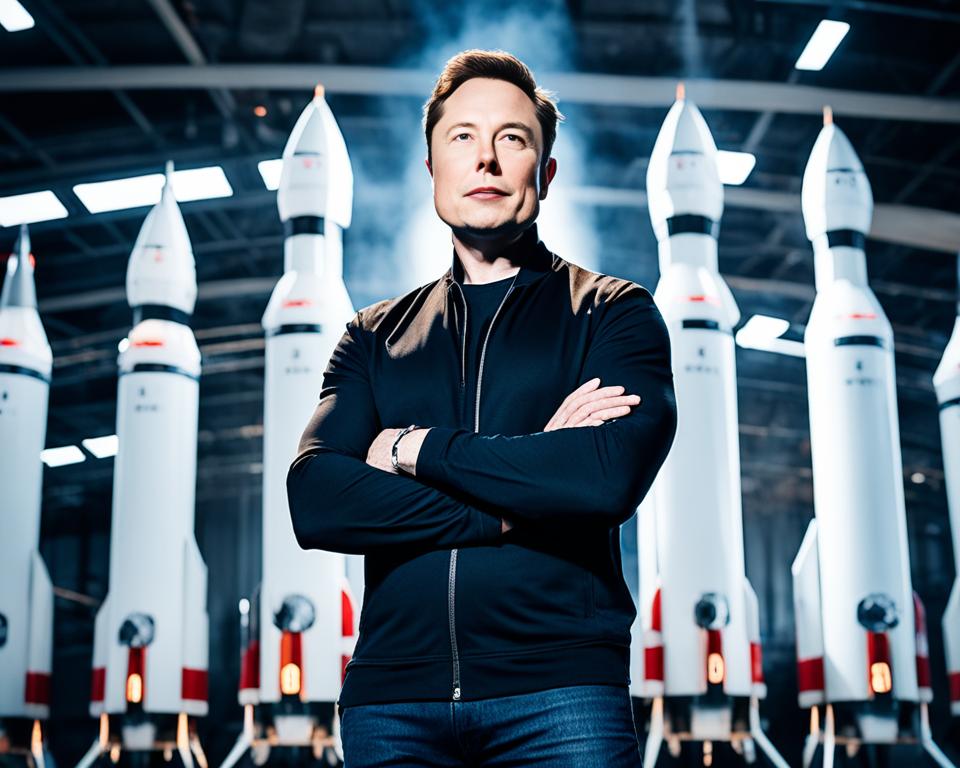Elon Musk's Leadership: A Critical Analysis

Table of Contents
The Visionary Approach: Driving Innovation and Disruption
Elon Musk's leadership is characterized by a profoundly visionary approach, pushing the boundaries of what's possible and inspiring others to follow. This is achieved through two key strategies.
Setting Ambitious Goals and Inspiring Teams
Musk is renowned for setting audacious goals – goals that often seem impossible to achieve. This ambitious goal-setting, coupled with tight deadlines and immense pressure, has undeniably driven innovation at Tesla, SpaceX, and other ventures under his purview.
- Tesla's Model 3 production: The ambitious goal of mass-producing the Model 3, initially plagued with production hell, ultimately showcased Musk's ability to push his teams to overcome seemingly insurmountable challenges.
- SpaceX's reusable rockets: The development of reusable rockets, a concept previously deemed impractical, significantly reduced the cost of space travel, a testament to Musk's visionary leadership and the teams' dedication.
- The Hyperloop concept: While still in its developmental stages, the ambitious Hyperloop project demonstrates Musk's continuous pursuit of groundbreaking technological advancements.
This high-pressure environment, while undeniably effective in achieving ambitious targets, also raises questions about its impact on employee morale and long-term sustainability.
Risk-Taking and Failure as Learning Opportunities
A defining characteristic of Elon Musk's leadership is his willingness to embrace significant risks. Failures are not viewed as setbacks, but rather as invaluable learning opportunities. This iterative development process, characterized by rapid prototyping and continuous improvement, has been instrumental in his success.
- The Falcon 1 failures: Early failures of SpaceX's Falcon 1 rocket ultimately paved the way for the successful Falcon 9, demonstrating the value of learning from setbacks.
- Tesla's early production challenges: Challenges in early Tesla production lines were addressed through continuous refinement and adaptation, illustrating the iterative nature of Musk's approach to innovation.
- Neuralink's ambitious goals: Neuralink's pursuit of brain-computer interfaces, though controversial, reflects Musk's unwavering commitment to pushing technological boundaries despite considerable risks.
This approach, however, necessitates effective risk management strategies to mitigate potential catastrophic failures.
The Controversial Aspects: Criticism and Public Perception
While undeniably successful, Elon Musk's leadership style has attracted significant criticism. His management style and public relations strategies are often at the center of this controversy.
Authoritarian Management Style and its Consequences
Musk's leadership is often described as authoritarian, with a demanding and sometimes autocratic approach. This has led to controversies surrounding workplace culture and employee treatment.
- Allegations of excessive pressure and demanding work conditions: Numerous reports detail the intense pressure and long hours expected of Tesla and SpaceX employees.
- Unionization efforts and employee relations: Musk's resistance to unionization efforts further highlights the tension between his management style and employee rights.
- High employee turnover rates: The demanding nature of his leadership style may contribute to high employee turnover in his companies.
This authoritarian approach, while potentially effective in driving short-term results, raises serious concerns about employee well-being and long-term retention.
Public Relations and Brand Image Management
Musk’s prolific use of social media, while amplifying his brand, has also generated controversy. His tweets and public statements often impact stock prices and the public perception of his companies.
- Controversial tweets and statements: Musk's impulsive tweets have repeatedly caused market fluctuations and damaged the reputation of his companies.
- Impact on investor confidence: The volatility associated with Musk's public pronouncements affects investor confidence and market stability.
- Blurring lines between personal brand and company image: Musk's personal brand is inextricably linked to the image of his companies, creating a significant risk management challenge.
Effective management of public relations and communication strategy is crucial for mitigating the negative consequences of this approach.
Analyzing the Long-Term Impact: Sustainability and Ethical Considerations
The long-term viability of Elon Musk's leadership model and the ethical implications of his disruptive innovations deserve careful consideration.
The Sustainability of Musk's Leadership Model
The high-pressure, demanding nature of Musk's leadership style raises questions about its long-term sustainability. Can this approach be scaled effectively without leading to widespread burnout and decreased productivity?
- Scalability challenges: Replicating Musk's leadership style across larger organizations presents significant challenges.
- Potential for burnout: The intense work environment can lead to employee burnout and reduced effectiveness.
- Need for adaptable leadership styles: A more adaptable and inclusive leadership approach may be necessary for sustained success in the long term.
Musk's leadership model, while effective in certain contexts, may require adaptation to ensure long-term organizational health and growth.
Ethical Implications of Disruptive Innovation
The rapid pace of technological advancement under Musk's leadership raises crucial ethical questions.
- Ethical dilemmas in AI development: The development of advanced AI technologies raises concerns about potential misuse and societal impact.
- Environmental impact of SpaceX's space exploration: The environmental impact of space launches and the disposal of rocket components needs careful consideration.
- The role of regulation and oversight: Appropriate regulation and oversight are necessary to ensure responsible innovation and mitigate potential risks.
Responsible innovation and ethical considerations must be central to the continued advancement of these technologies.
Conclusion
Elon Musk's leadership is a complex and multifaceted phenomenon. His visionary approach, characterized by ambitious goal-setting and a willingness to embrace risk, has undeniably driven remarkable innovation. However, his authoritarian management style, controversial public relations strategies, and the ethical implications of his rapid technological advancements necessitate critical evaluation. Ultimately, understanding the strengths and weaknesses of Elon Musk's leadership provides valuable insights into the challenges and opportunities of modern business and innovation. What aspects of Elon Musk's leadership are most impactful, and what lessons can be learned from his approach? Further exploration of these questions is encouraged through research and discussion on related articles and resources to gain a deeper understanding of this influential leadership style.

Featured Posts
-
 Deutsche Stadt Bietet Kostenlose Unterkuenfte Fuer Neue Einwohner
May 31, 2025
Deutsche Stadt Bietet Kostenlose Unterkuenfte Fuer Neue Einwohner
May 31, 2025 -
 Northeast Ohio Power Outages Latest Statistics And Outage Map
May 31, 2025
Northeast Ohio Power Outages Latest Statistics And Outage Map
May 31, 2025 -
 Updated April Outlook Whats New And What To Expect
May 31, 2025
Updated April Outlook Whats New And What To Expect
May 31, 2025 -
 Tuerker Inanoglu Ve Guelsen Bubikoglu Sosyal Medyada Guendem Olan Paylasim
May 31, 2025
Tuerker Inanoglu Ve Guelsen Bubikoglu Sosyal Medyada Guendem Olan Paylasim
May 31, 2025 -
 Comerica Park Hosts Detroit Tigers And Chicago White Sox For Opening Day 2025
May 31, 2025
Comerica Park Hosts Detroit Tigers And Chicago White Sox For Opening Day 2025
May 31, 2025
